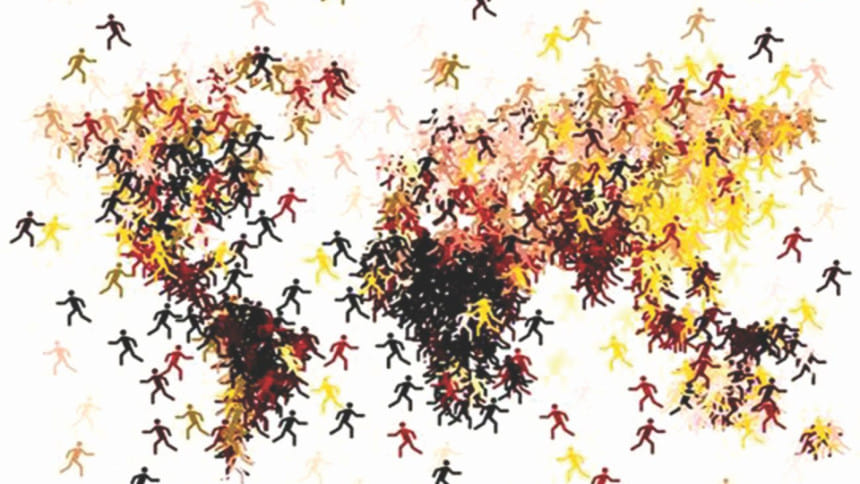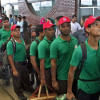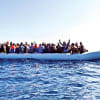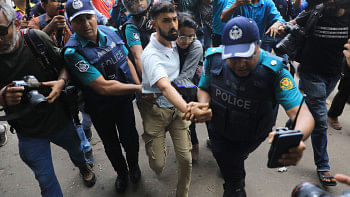The Migration Superpowers

We have entered the age of migration. If all the people who live outside the country of their birth united to form their own – a republic of the rootless – it would be the fifth-largest country in the world, with a population of more than 240 million people.
Though much has been written about how a world on the move is changing national politics, there has been little consideration of its geopolitical effects. But the mass movement of people is already creating three types of migration superpowers: new colonialists, integrators, and go-betweens.
The new colonialists call to mind the settlers from Europe who spread across the world in the eighteenth and nineteenth centuries, benefiting not just themselves, but also their homelands. Similarly, the most mobile populations of the twenty-first century are helping their countries of origin obtain access to markets, technology, and a political voice in the world.
The American journalist Howard W. French describes how Africa has become "China's second continent," as more than a million new Chinese settlers remake Sub-Saharan Africa. With more Chinese citizens living outside mainland China than there are French people living in France, a similar story is playing out on almost every continent. When those migrants return to China, their capabilities are expertly harvested. Known in China as "sea turtles," they dominate their country's technology industry.
India, too, has a large diaspora of an estimated 20 million citizens who are super-successful and hyper-connected. Indian-born entrepreneurs are responsible for setting up one in ten companies in Silicon Valley. Microsoft's chief executive is of Indian origin, as is the inventor of the Intel Pentium processor, the former chief technology officer at Motorola, and the CEO of Google.
How does this benefit India? For starters, India receives more than $70 billion in remittances every year, the largest sum worldwide, amounting to nearly 4 percent of its GDP, which is more than it spends on education. And while it may not be possible to prove a causal connection, the influx of Indians into America has coincided with a shift in both countries' geopolitical orientations, as evidenced by the historic 2008 nuclear deal by which the US abandoned its policy of equidistance between India and Pakistan.
With so many people on the move, it is even possible to become a settler superpower without being recognised as a state. The estimated 35 million Kurds – who regard themselves as a nation without a country – are becoming one of the most politically active migrant populations in Europe. It is likely no coincidence that the governments of Sweden and Germany, with their large populations of Kurdish origin, are providing militarily support to the Kurdish Peshmerga in their fight against the Islamic State (ISIS).
The second type of superpower is the integrator. Libraries could be filled with books about how the United States has benefited from its ability to transform people from around the world into American citizens. Similarly, Angola and Brazil have reversed the brain drain and are receiving large flows of immigrants from their former colonial ruler, Portugal. But the two most eye-catching experiments in integration today are Israel and ISIS.
Immigration from the diaspora is essential to Israel, which is reflected in the Hebrew word for it: aliyah, derived from the verb "to ascend." Indeed, the government provides "aliyah consultants," as well as free one-way flights, language classes, and practical support. As a result, Israel's population has risen nine fold since the country's founding in 1948.
In Start-up Nation: The Story of Israel's Economic Miracle, co-authored with Saul Singer, the American writer and political adviser Dan Senor poses a fundamental question. "How is it," he asks, "that Israel – a country of 7.1 million people, only sixty years old, surrounded by enemies, in a constant state of war since its founding, with no natural resources – produces more start-up companies than large, peaceful, and stable nations like Japan, China, India, Korea, Canada, and the United Kingdom?" The answer, of course, is immigration.
ISIS's leaders would not be happy with the comparison, but their group's rapid emergence on the map has drawn some lessons from Israel. The so-called Islamic State may not be officially recognised by anyone, but it is being built on the basis of immigration. According to the Soufan Group, roughly 30,000 people from 86 countries have travelled to ISIS-held territory in Syria and Iraq.
The third type of immigration superpowers are go-betweens, which use their geography to extract concessions from migration-phobic neighbours. The most notable example is Turkey; once forced to beg to be considered for European Union membership, it now dictates the terms of its relationship with Brussels. A leaked transcript of a recent summit with European leaders revealed how President Recep Tayyip Erdoğan threatened to bus refugees to Greece and Bulgaria if his demands were not met.
Niger is another go-between. As a major transit hub through which 90 percentof all West African migrants pass on their way to Italy, Niger succeeded in securing €600 million ($680 million) in the last EU aid budget. In doing so, it followed the example of Libya's Muammar el-Qaddafi, who famously warned that Europe would "turn black" if it did not pay him to hold back migrants attempting to cross the Mediterranean.
If the established powers that first benefited from the globalisation of trade are known as the G-7, the countries, regions, and organisations that are benefiting from migration – China, India, Kurdistan, Israel, ISIS, Turkey, and Niger – could be called the M-7. As control over population flows become a currency of power, states that follow the M-7's lead will have the opportunity to boost their geopolitical heft.
For the West, the biggest challenge will be to reconcile domestic pressure for closed borders with the geopolitical advantages of embracing migration. For now, at least, it seems that the G-7 – for which an easily affordable influx of refugees has somehow become a "crisis" – will continue to aid the M-7's rise.
The writer is Director of the European Council on Foreign Relations.
Copyright: Project Syndicate, 2016.
www.project-syndicate.org
(Exclusive to The Daily Star)

 For all latest news, follow The Daily Star's Google News channel.
For all latest news, follow The Daily Star's Google News channel. 








Comments